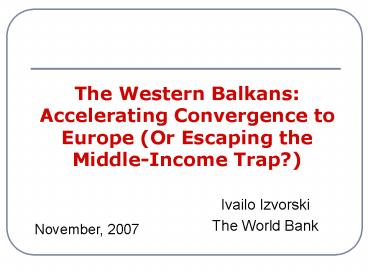Ivailo Izvorski - PowerPoint PPT Presentation
1 / 19
Title:
Ivailo Izvorski
Description:
Will SEE grow older before getting rich? Will SEE open up more to trade, FDI ... Mont. fYRM. Cro. BH. Alb. Real GDP growth has been robust, if unspectacular ... – PowerPoint PPT presentation
Number of Views:51
Avg rating:3.0/5.0
Title: Ivailo Izvorski
1
The Western Balkans Accelerating Convergence to
Europe (Or Escaping the Middle-Income Trap?)
- Ivailo Izvorski
- The World Bank
November, 2007
2
Outline
- Output growth and convergence
- Three key issues
- Will SEE grow older before getting rich?
- Will SEE open up more to trade, FDI and
knowledge? - Will the capacity to absorb the knowledge be
there? - A reform agenda
3
Western Balkans Selected Indicators
4
Real GDP growth has been robust, if unspectacular
5
compared with other countries (2000-06 average,
)
6
Open economies grow faster
7
What is open (Sachs and Warner)
- Effective protection rates less than 40
- Have quotas on less than 40 imports
- Have no currency controls/black markets
- No export marketing boards
- Not socialist
- Is convergence assured?
8
Exports crucial for small countries, but still
low relative to GDP
9
Exports are largely for low-skilled products and
natural resources, while wages are rather high
- CI Capital-intensive
- SI Skill-intensive
10
Other concerns on exports
- Trade preferences eroding
- Productivity growth through labor shedding is
coming to an end in some countries - Wage pressures, high contribution rates
- Service exports
- Producer networks?
11
FDI crucial for exports and growth
- Small countries, size matters
- Openness?
- Why not invest in Slovakia or Turkey?
- Stock FDI (2005)
- Western Balkans (17 m pop) 11 billion
- Croatia (4.5m pop) 12.5 billion
- Slovakia (5.4 m pop) 15.3 billion
12
SEE Integration (Trade)
- Market segmentation
- CEFTA 2006
- A lot remains to be done
- border frictions CEFTA cumulation of rules of
origin extension into Pan-Euro-Med cumulation
regional cooperation in services, possibly EU MFN
rates - Benefits
- more competition in the supply of goods and
services, higher FDI (single market), and more
intra-regional supply chains
13
SEE Integration (Labor)
- Will need an agreement on movement of skilled
labor - Can start bilaterally
- Mutual recognition of professional qualifications
and educational institutions - Temporary worker agreements
- Return migration programs can help in skill
formation
14
Human capital
- Strengthening human capital is key
- Long lags, poor education outcomes
- Skills constraint in BEEPS 2005
- High reservation wages remittances?
- Productivity improvements critical to outgrow
relatively high wages cuts in labor taxes
15
Summary and outstanding agenda
- Substantial progress, but still lagging central
Europe and other emerging markets - How to boost convergence (escape the trap)?
- Population structure, openness, education quality
are not external variables policy has a role - The agenda
16
1. Core agenda
- Ease political uncertainty and instability
- Domestic and regional
- Enhance macroeconomic stability
- Monetary and fiscal prudence
- Reform the business environment
- Improve governance
- Revamp government spending
- Pro-growth contribution rates outcomes
17
2. Open up, strengthen integration
- Openness is crucial
- Small countries market size matters for FDI
- WTO accession (BH, Serbia, Montenegro)
- Non-tariff barriers and barriers to investment
- Regional and EU integration
18
3. Boost human capital
- Education delays in reform have been harmful
- Labor markets and continued education
- Regional labor markets
- Labor taxes and reforms of social insurance
19
4. Wisely improve infrastructure
- Liberalize, reform, invest wisely Ireland
- Broad policy issues need to be addressed
- Fiscal space, prioritization, private sector,
transparency - Energy
- So far, a constraint only in Albania and Kosovo
- But pre-empt bottlenecks
- Regional approach, ECSEE
- Telecoms liberalization needed, and better
before privatization































